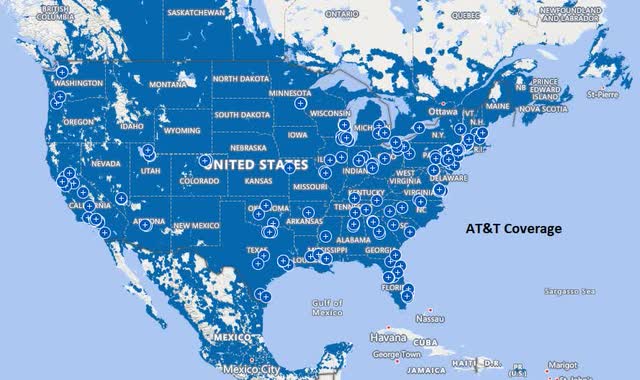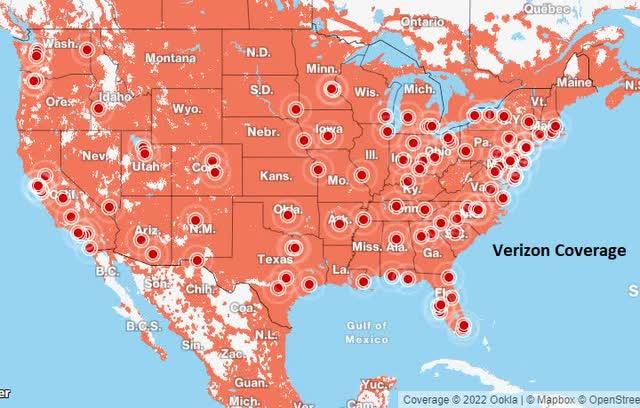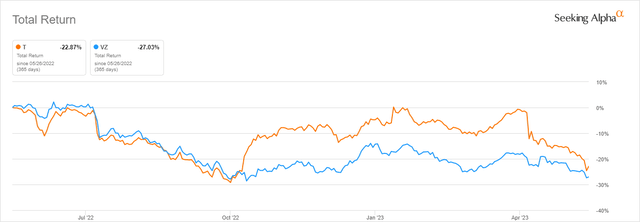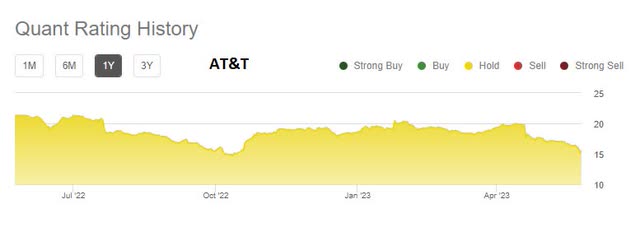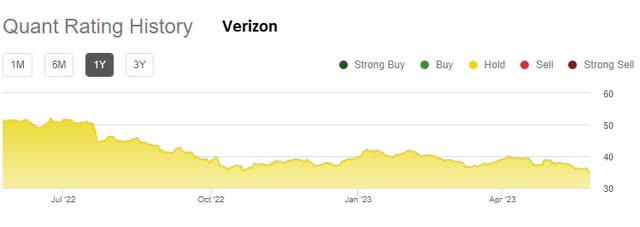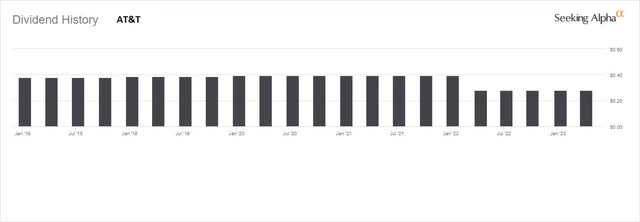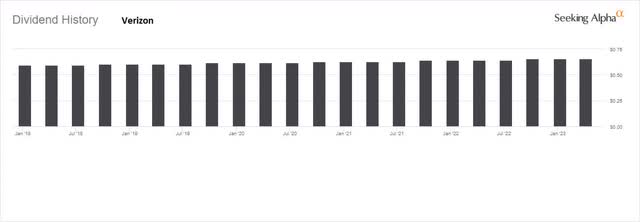With 7% Dividends, Which Is The Better Choice - AT&T Or Verizon Stock?
Summary
- Based on financial metrics, AT&T Inc. looks to be underpriced relative to Verizon Communications Inc.
- Analysts like both companies, but quants are neutral.
- Although both stocks have a 7% dividend, AT&T Inc. stock has the lower payout ratio.
- Looking for a helping hand in the market? Members of Turnaround Stock Advisory get exclusive ideas and guidance to navigate any climate. Learn More »
JLco - Julia Amaral/iStock via Getty Images
AT&T Inc. (T) and Verizon Communications Inc. (VZ) are two of the largest telecommunications companies in the world, with combined revenue of almost over $250 billion. Each of them has a substantial dividend currently paying in excess of 7%.
Both companies are also in the top 6 in market value for telecommunications companies with AT&T being number 6 and Verizon being number 4.
companiesmarketcap.com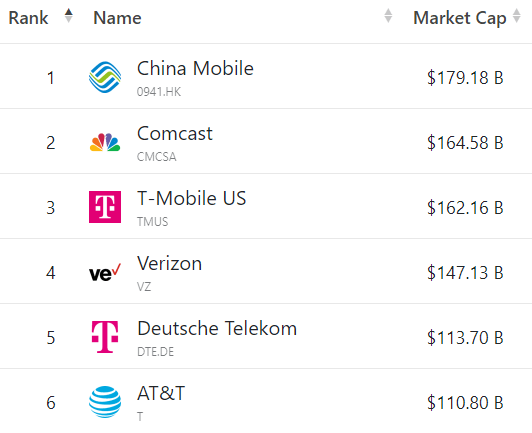
Both AT&T and Verizon services are available throughout the U.S., Canada, and Mexico.
Over the last year, both companies' Total Return (including dividends) has been negative, with T down 23% and VZ down 27%.
In this article, we will analyze both companies' history and the potential advantages of each company as an investment for capital gains and dividends over the next year.
Financial metrics
A major part of the decision-making process in selecting stocks and dividend stocks in particular is the company's future viability. How likely are they to have the financial ability to at least keep the current dividend intact and better yet increase it each year going forward?
When we look at the financial metrics comparing the two companies on a TTM (Trailing Twelve Month) basis, several metrics should be noted.
The Gross Margin % (Line 5) for both companies is large, with T winning at 59% to 56%. Large margins such as these indicate both companies have the potential to generate huge cash flows and subsequently dividends. But based on GM to Market Value Percentage (Line 8), T's margin is much higher than VZ's, 64% to 52%. Enterprise Value Gross Margin (Line 9) is also higher for AT&T 31% to 26%. This may indicate that T is undervalued compared to VZ based on market value and enterprise value.
Seeking Alpha and author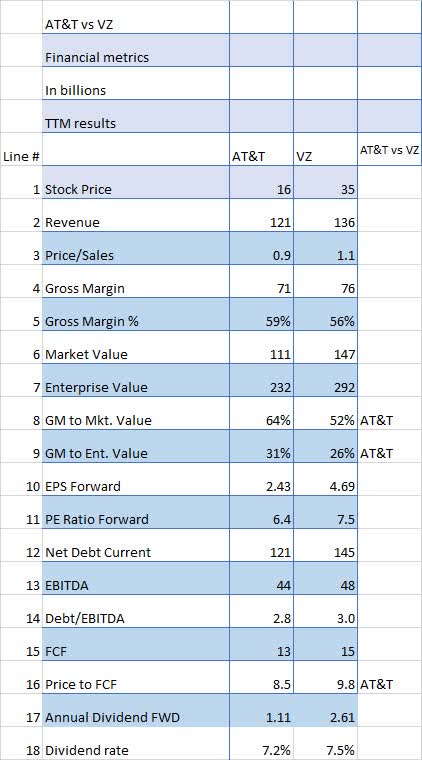
When it comes to Debt/EBITDA (Line 14), T looks somewhat better, with a ratio of 2.8x versus VZ 3.0x.
The Price to FCF (Free Cash Flow, Line 16) also shows an advantage to AT&T.
And finally, the dividend rate (line 18) shows both companies about the same in the 7% range. We will look at the dividends in more detail later in this article.
When looking at the Financial Metrics in total, AT&T looks to be a bit underpriced relative to Verizon.
Based on financial metrics, AT&T is the winner.
Wall Street analyst ratings show both are about equally liked, but the quant community rates both as Holds
Wall Street analysts appear to have relatively strong feelings for both, with Wall Street plus Seeking Alpha analysts combined showing 52 Buys and only 9 Sells. One thing to note is the rather large 26 Holds for Verizon indicating there is some doubt from analysts about VZ.
Seeking Alpha
Quant ratings over the last year are very similar, showing nothing but Hold ratings for both T and VZ.
Not much enthusiasm from quants for either company.
Keep in mind that quant ratings have little to do with whether a company is a good dividend stock, especially over the long term.
Dividends and free cash flow
AT&T does not have an exemplary record on dividends, having cut its dividend by 28% last year after the spinoff of Warner Brothers to Discovery.
In contrast, VZ has raised its quarterly rate from $.59 to $.65 over 5 years, an increase of 10%.
Verizon has also raised its dividend for 18 consecutive years, an enviable record for any company.
So, if you're looking for a steady, consistently increasing dividend, Verizon is the obvious pick.
The other important consideration for dividends is the dividend to Free Cash Flow ratio. In this important metric, T comes out ahead with a payout ratio of 61% versus 73% for VZ.
Author
When it comes to dividends, Verizon wins with its long history of dividend increases but falls short of AT&T when it comes to sustainability considering the amount of FCF it takes to keep VZ's dividend increasing each year.
Conclusion
When making decisions about dividend stocks, one of the main considerations has to be how long you plan on holding the stock. Obviously, we know from the dividend paragraph above that Verizon Communications Inc. has increased its dividend for 18 years in a row and that AT&T Inc.'s dividend was cut substantially last year.
So from the above, VZ has a much better dividend history but falls behind AT&T on such financial metrics as Gross Margin, P/E ratio, FCF Ratio, and percentage of FCF needed to cover the dividend. AT&T also has a better Debt/EBITDA ratio. This would imply that AT&T Inc. stock is underpriced relative to that of Verizon Communications Inc.
Based upon all of the above, I rate AT&T Inc. stock a Buy and Verizon Communications Inc. stock a Hold.
If you found this article to be of value, please scroll up and click the "Follow" button next to my name.
Note: members of my Turnaround Stock Advisory service receive my articles prior to publication, plus real-time updates.
This article was written by
Analyst’s Disclosure: I/we have a beneficial long position in the shares of T either through stock ownership, options, or other derivatives. I wrote this article myself, and it expresses my own opinions. I am not receiving compensation for it (other than from Seeking Alpha). I have no business relationship with any company whose stock is mentioned in this article.
Seeking Alpha's Disclosure: Past performance is no guarantee of future results. No recommendation or advice is being given as to whether any investment is suitable for a particular investor. Any views or opinions expressed above may not reflect those of Seeking Alpha as a whole. Seeking Alpha is not a licensed securities dealer, broker or US investment adviser or investment bank. Our analysts are third party authors that include both professional investors and individual investors who may not be licensed or certified by any institute or regulatory body.

